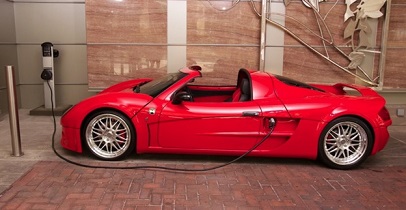
Last June, MGM Resorts International activated a solar park that will power up to 90 percent of its 13 Las Vegas properties. According to the Associated Press, the company says the initiative is “the hospitality industry’s largest renewable energy project.”
In April 2021, Reuters reported that 12 U.S. governors called on President Joe Biden to support ceasing sales of new gas-powered vehicles by 2035—an effort that California Governor Gavin Newsom issued an executive order on for his state in fall 2020. There are currently about 2 million electric vehicles (EVs) on the road and, according to Bloomberg New Energy Finance, there will be about 26 million by 2030.
So, what does all this mean for revenue optimization professionals?
HSMAI’s Revenue Optimization Advisory Board recently discussed the potential impact of commercial solar and EV charging on hotels’ revenue and profit strategy. While the demand for solar and EV charging has been on the rise, there’s still uncertainty surrounding how—or if—hotels should tap into this opportunity, and if they do, how to monetize it. For revenue optimization professionals who might have this on their radar, here are some considerations that arose from the advisory board discussion.
On Profitability
- “[When talking about solar], the first thing I thought was, ‘That’s great for profitability.’ Over the lifecycle of holding an asset, that’s probably a significant amount of profit. But how do you reinvest that? There are probably some structural improvements you could address, but as our industry is grappling with talent and hiring, could you re-allocate any utility savings to human resources initiatives? Recruitment, development, and retention are three focus areas that come to mind. As revenue optimization professionals who are hopefully making that shift toward being overall commercial or business strategy influencers, that’s the conversation we must have—it’s not just about profit maximization; it’s about money that can be reinvested in our human resources.”
- “To me, [solar] is essentially a no brainer. With rising electricity costs and plenty of federal, state, and utility incentives, the ROI generally pencils out over the short-term with solar. I wish we could address those opportunities at the time we start talking about new hotel building designs because it’s just the right thing to do. Upfront CAPEX investment may seem cost prohibitive, so focusing on the long-term impact is critical. That’s the challenge we need to figure out.”
- “In the past, [these offerings] were great for marketing purposes. You were able to get so much visibility out of promoting them. Today, it is much more of a revenue play because we’re seeing all these big corporate and group accounts making their decisions to book with you dependent on your sustainability efforts. When renewing negotiated rates for 2022, our sales teams had to answer a full page of sustainability-related questions versus very few only a couple of years ago. A number of those questions are related to solar and EV charging, and if those can’t be answered to satisfaction, you likely won’t be considered as a partner. In the future, that’s going to become even more important. If you want those revenues, then you better get with the program.”
On Sustainability
- “When, not if, we proceed with expanding our EV charging footprint, we need to be careful with the messaging we give to guests because they’re savvy. Promoting EV charging as part of our sustainability efforts but charging above and beyond our basic costs and expenses isn’t going to work. Guests are going to turn around and say, ‘This isn’t about sustainability and caring about [the environment]—it’s about making more money.’”
- “We have dismal electricity grids across the nation. Let’s remember the rolling blackouts in California and winter power crisis in Texas in 2021. Additionally, we saw power outages due to wildfires and other extreme weather events. So, at some point, commercial hotel solar becomes not only a topic of sustainability and profitability, but also of building resiliency.”
On Monetization (Amenity vs. Additional Fee)
- “[With EV charging], we offer it for free to bolster and support our sustainability efforts, but also to provide a lever we can use in marketing to generate demand. In our newest project down in the desert, we have solar panels generating some of the electricity for the property. It’s something we’ve looked at for every project. Right now, the cost of solar panels is still high, but as electricity rates continue to go up, that becomes more of a reality. Not only is it the right thing to do in terms of supporting sustainability efforts, but as revenue professionals, it’s our job to create ideas and work collaboratively with the team to come up with ways to create demand.”
- “From a behavioral standpoint, I was curious about what customers are doing, and there’s about 40,000 average searches per month [on Google] for electric car charging. But then when you add the term ‘hotel’ to that, there’s no data at this point. And it’s not to say that no one’s searching for it, but I think it does say that consumers are not aware hotels are offering this or they’re not looking for it. From a messaging standpoint, it looks like, at least from the data that Google is showing, there’s opportunity there.”
- “I think it’s easy to offer EV charging as an amenity, if it’s not constrained. And when it does become constrained at some point in the future, it becomes a much more interesting and challenging problem to solve and a potential opportunity.”
- “It’s like what we’ve seen with Wi-Fi maybe a decade ago, where initially it was this value-add and a major differentiator. Hotels were saying, ‘Hey, we have Wi-Fi,’ and then at some point it became, ‘Hey, we have free Wi-Fi.’ Now customers are saying, ‘You don’t have Wi-Fi? I’m not going to stay with you.’ That trend is something that’s been projected to happen with EV charging capabilities as well.”
- “To be clear on the monetization piece, it’s not necessarily monetizing the electricity that you’re selling. That’s minuscule. It’s the additional room night you’re getting through it because you can competitively differentiate yourself by having a solid setup.”
On Potential Partnerships for EV Charging
- “It would be interesting to see data or trends on rental car companies moving toward EVs. Between the car, the hotel, and the ability to charge that car, it lends itself to a package or bundle type of opportunity, where the revenues could be shared. And maybe there’s an opportunity for third parties to do that.”
 This conversation brought up many interesting viewpoints, all driving back to the overarching idea that revenue optimization professionals must stay creative and vigilant in developing new opportunities. As one advisory board member put it, “What other sources of revenue are out there that a traditional revenue rooms-based manager may not be thinking about? What other sources are revenue professionals missing because we’re not thinking outside of the traditional, ‘I have X number of rooms to sell a night’?”
This conversation brought up many interesting viewpoints, all driving back to the overarching idea that revenue optimization professionals must stay creative and vigilant in developing new opportunities. As one advisory board member put it, “What other sources of revenue are out there that a traditional revenue rooms-based manager may not be thinking about? What other sources are revenue professionals missing because we’re not thinking outside of the traditional, ‘I have X number of rooms to sell a night’?”
One way to start thinking outside of the traditional is, if you have the bandwidth, to touch base with your design and construction teams for future projects. Think ahead on how your organization might tackle EV charging, commercial solar and energy storage in the future. These are three components to look at that can ultimately generate more revenue and profit.
About the Author & HSMAI
Christian Boerger, CRME, CHDM, CHBA, is Vice President of Revenue Strategy at Oxford Collection, and is an HSMAI Revenue Optimization Advisory Board member.
The Hospitality Sales and Marketing Association International (HSMAI) is committed to growing business for hotels and their partners and is the industry’s leading advocate for intelligent, sustainable hotel revenue growth. The association provides hotel professionals and their partners with tools, insights, and expertise to fuel sales, inspire marketing, and optimize revenue through programs such as the Adrian Awards, HSMAI ROC, Marketing Strategy Conference, and Sales Leader Forum. Founded in 1927, HSMAI is a membership organization comprising more than 5,000 members worldwide, with 40 chapters in the Americas Region. Connect with HSMAI at hsmai.org, HSMAI Facebook, HSMAI Twitter, and HSMAI YouTube.







